- Home
- Brian Garfield
Kolchak's Gold Page 5
Kolchak's Gold Read online
Page 5
The gold was shipped to the city of Omsk and was parked on a siding in the marshaling yards; it was placed under guard by a flimsy detachment of White Army troops. Before long, everyone—White and Red alike—knew it was there. But neither side seemed to attach very great importance to it and it stayed in the marshaling yards aboard its weather-beaten goods wagons for the next four months without incident. In the meantime both sides suffered for lack of funds.
4.
KOLCHAK: SUPREME RULER OF ALL THE RUSSIAS
Aleksandr Vasilyevich Kolchak was born in 1874 the son of a Russian army officer. Why he decided on a naval career was a mystery to his family but—oddly, in the light of forthcoming events—Aleksandr Kolchak became a first-rate naval officer.
During the war against the Central Powers he commanded the Black Sea Fleet. His crews regarded him as a compassionate man; they were among the few who did not mutiny during the March 1917 naval revolts. Kolchak was also courageous (he had led several bold forays of exploration into the Arctic) and even efficient (he had been a key reorganizer of the Russian navy after its catastrophic defeat by the Japanese at Tsushima, a decade earlier).
In June 1917 the revolutionaries finally took control of his Black Sea Fleet. They demanded that Kolchak disarm his officers and surrender his sword to them. He expressed his contempt for these demands by tossing his sword over the side into the waters of Odessa harbor and stalking ashore. None of the revolutionaries had nerve enough to stop him.
Kolchak was diminutive and birdlike: impatient, pale, nervous in his quick movements. He always dressed impeccably and shaved with care. His small round head was dominated by a great curved prow of a nose which separated a pair of grey eyes of ferocious and penetrating brilliance. Precise, cold, mercurial, aloof.
In 1918 he was a vice admiral without a command. Toward the end of that year he made his way to Tokyo in order to offer his services to the British Royal Navy in whatever capacity they might see fit to employ him usefully, whether against the Germans or against the Bolsheviks. But the British hadn’t much use for him and Kolchak languished as a near-charity case in a second-class Tokyo hotel: alert and energetic, but without purpose, he simmered in stunted hope for a reprieve from boredom. He did not drink very much but he came to know the pleasures of narcotic drugs and was known to use the stimulant cocaine; General Pierre Janin later insisted Kolchak was an addict.
Kolchak’s constant visits to the British Embassy brought him to the attention of the British Military Representative in Siberia, Major General Sir Alfred Knox.
There was none of the robust bearded-warrior quality of Russian ruthlessness about Kolchak and possibly this endeared him to Sir Alfred. The British general listened with interest to the diminutive admiral’s views on the conflict in Russia. Kolchak impressed the British general to the extent that Sir Alfred went away insisting that Kolchak was the great White hope.
[The Whites themselves at this time had incredibly few anxieties about their chaotic lack of organization, but the Allies—particularly the British—were desperate in their insistence that the Whites produce a single leader upon whom the Allies could rely for coordination, command and liaison.]
The Allies finally got what they wanted. An English major general, supported by Czech and Japanese and French and American officials, succeeded in imposing upon Russia a one-man government in the person of Admiral Aleksandr V. Kolchak, Supreme Ruler of All the Russias.
“I do not believe that [General Sir Alfred] Knox reckoned on Kolchak’s temperamental character. The Admiral was undoubtedly on his best behavior in those early days, but he had an erratic and violent temper. Much later, when we were aboard his train, I remember that the Admiral’s desk had to be resupplied every morning with pens and inkwells and that sort of thing, because during the course of a day’s business he would fly into at least one rage in which he would smash everything breakable he could lay his hands on.
“He had what you would have to call an intransigent sense of principle, but he was filled with unstable energies. I’m convinced he was honest, but he was weak; he was determined but rather adolescent—he would react to bad news with an almost catatonic frown, like a child’s—solemn and innocent. He really was uncontrollably neurotic. And I had the feeling he was always inclined to be persuaded by the last person who talked to him.”
Kolchak traveled with a retinue that included several personal servants and his mistress, whose husband was one of Kolchak’s officers. [Kolchak’s wife and children were safely ensconsed in Paris for the duration.]
Kolchak was undoubtedly a man of naïveté and excesses. But he saw through to the realities of the Civil War to the extent that he quickly realized the uselessness of the Whites’ strategy of evasive harassment. His armies were soloists who could not harmonize; they had Lenin outgunned, outmanned and outsupplied, yet they had made virtually no progress toward Moscow.*
Unfortunately Kolchak’s early efforts to set this right were undermined by his own command structure. His government, of which he was “supreme ruler,” had little actual military control. The Allies had imposed upon White Russia a commander in chief of armed forces in the person of General Pierre Janin, the ranking member of the French Military Commission. Janin took his orders from Paris.
The American Expeditionary Force in Siberia was commanded by Major General William S. Graves, who stayed in Vladivostok almost the whole time and, under orders from President Woodrow Wilson, refused to intervene in Russian internal affairs except by using his troops to guard the Trans-Siberian Railway. General Sir Alfred Knox, having installed Kolchak, seemed to feel his responsibility had been met and he made no apparent effort to help clarify the command structure between Janin and Kolchak. Janin himself was a gruff soldier who spoke poor Russian and was as inept at strategy as he was expert in tactics.
“Admiral Kolchak was a liberal. It was not through his own design that he found himself put in a position of dictatorship. I felt he regarded it as an enigmatic position—he never seemed to decide how to handle it. He lacked a tyrant’s personality, the despotic inclinations; he never seemed to realize the extent of the powers that had been given to him.
“He didn’t have the ruthlessness or force of will to make subordinates submit to his demands, and he had no effective means of contact with the ordinary people—he was a remote sort of man, he had no public personality, he spoke at gatherings only with great awkward discomfort.
“Many of our generals in the field were characterized by a suicidal and hysterical incompetence. When they made decisions that were obviously wrong, the Admiral would let them have their way until it got too late, when inevitably he would relieve them of command with utmost regret and then replace them with equally incompetent generals who were additionally handicapped by their total ignorance of the field situation.
“He never knew whom to trust. He believed everyone and no one. He had altogether the wrong political philosophy for the circumstances. As an example, one of his first acts in office was to call for a National Assembly to be freely elected as soon as the war ended. Naturally this incensed most of his officers, who regarded such ideas as useless democratic political euphemisms, mysterious to soldiers of more cynical persuasions. Many of the officers wanted to restore the monarchy and he bowed to their wishes and dropped his proposal instead of ordering them to quit disputing him.”
He was burdened impossibly from the very beginning with a staff of more than nine hundred* beautifully tailored and extraordinarily dishonest subordinates, most of them completely unfit for military duties. White officers and politicians engaged in incredible profiteering schemes and speculations. There was a black market in trains: whole trains were stolen, their contents sold in back alleys. Kolchak’s Northern Force at gunpoint stole shipments of supplies earmarked for his Western Force. Officers couldn’t be bothered to feed or clothe their men; staples and military medical supplies were sold at incredible prices.
Kolchak was aware of the corruption i
n which he was engulfed: He appointed several investigatory commissions, but none of them produced any results. No officers, regardless how guilty or incompetent, ever got fired. The moody Admiral seemed to feel there was no point in dismissing the corrupt because the vacancies would only be refilled by men equally corrupt: there was no other kind.
What is remarkable is that for the first months of his tenure Kolchak enjoyed as much support as he did. Nearly all the bickering factions seemed willing to pay him lip service if not real loyalty. Perhaps he was so well accepted because people found it easier to confirm credentials than to assess character; at any rate he gave the White Russian movement the appearance of a central authority and for a while, in spite of everything, that was enough to elevate morale and produce a string of White military victories.
Kolchak had established his government in Omsk, a dreary city of vast gloomy state buildings on the barren plains of western Siberia. It had the flavor of a frontier camp, laid out along exact 200-meter square blocks with wide streets and single-story frame houses painted vivid hues. The city lay about two miles behind the railway marshaling yards, on the right bank of the wide Irtysh River, and was surrounded by a huge farm area of dairies and grain. In normal times it was a four-day train journey from Omsk northwest to Moscow.
The houses here were widely separated. Each had its pigsty or chicken coop, its stable or cow corral, its courtyard and cart shed. The big public buildings were Byzantine brick. There were a few cobblestone streets at the center but most thoroughfares were unpaved impacted dirt, powder-dusty in dry weather and muddy in wet. The wooden sidewalks were bordered by deep gutters and in the springtime each house pumped its cesspool out into these gutters so that the smell throughout Omsk was indescribable.
It was anything but a sophisticated capital. Yet for a brief time there was a spirit of elegance. Czarist officers in their grey greatcoats marched the walkways in polished boots; Kolchak’s own officers made splendid visions in their white uniforms with purple epaulets, their leather heels clicking on the marble floors of the state buildings. The city flapped with the banners of the new government: Kolchak’s colors were white and green and the banners were ubiquitous.
“My brother and I were subalterns together. We were assigned to foot companies guarding the railway yards at first—this was before the Czech Legion came. I remember the first time we saw the Admiral. He came with the French General, Janin, to review us. Our Captain at that time was a brute called Grigorenkov, a Muscovite. He saluted the reviewing officers with colonial violence. (Once, later on, I remember Grigorenkov actually groveling on his knees to kiss the boots of a superior officer when he was reprimanded. But of course when he returned to the battalion he cursed and kicked the subordinates there, myself included. I suppose that got it out of his system. Cringing and brutalizing are equal parts of the Russian character, I should say. We were always burdened with the kind of vermin who leap from your feet to your throat. Have you read Alexander Werth? He has the audacity to insist the Russians are a fundamentally unaggressive people!)
“I recall that walking along with General Janin, the Admiral could not get in step. It seemed to unnerve them both. I confess I always thought of General Janin as a thoroughly poisonous man, although I did not know him really at all and have no basis for that belief. We were being inspected in barracks and he hurried right along—his flapping greatcoat made the oil lamps flicker. He scowled a great deal and kept rubbing the back of his neck with his swagger stick. As for the Admiral, I was struck by what a small man he was. He had a watchful, alien sort of impassivity—it discouraged one from speculating, from inquiry. Certainly he had none of that, what you call charisma.
“Not too far away from me he stopped and asked one of my men a question. I did not hear it, but I heard the reply from the soldier. The Admiral must have asked something about our rations and the soldier had the temerity to complain there was not enough to eat.
“I heard the Admiral’s reply. He said, ‘Hungry dogs bite well.’ It was rather sad really, because I don’t believe he meant that; it was expected of him to say something like that, you see. Our company was in no fit shape at that or any other time for real fighting. The favorite joke around the barracks was that we should invite the enemy in and let them laugh themselves to death.”
“It is late enough in my life that I can admit this now. My brother and I were officers only because we were somewhat educated men, we did not ‘look Jewish,’ and we had falsified our backgrounds and our names. Our village in the Ukraine had been overrun by waves of Germans and Russians and Czechs. We had a great fervor to survive, Maxim and I. It shamed us both, unspeakably, but we took Russian names and pretended to be kulaks who had joined the White Army because the Reds had confiscated our farm.
“The Whites were as anti-Semitic as the Reds, of course. They were all Russians, weren’t they? The Whites tended to blame Jews for bolshevism. A few Red leaders were Jews, that’s true, but after a while the Whites were convincing themselves that Lenin himself was Jewish—a canard to which I imagine Lenin would have been the first to take offense, since anti-Semitism was no small part of his nature. At any rate the Whites persuaded themselves that all Jews were Bolsheviks, and the terror of pogroms—particularly the massacres by Cossacks—went on and on, on both sides.
“Some of the Admiral’s own people were particularly vile in that respect. You know of course about the rumors that spread after the assassinations of the royal family—that the Czar had been murdered by Jews. Even General Knox believed those rumors, he reported them as fact to London. And at Ekaterinburg some White Cossacks butchered thousands of Jews in reprisal after the Romanovs were killed there. But the Admiral himself was rather indifferent, I think. Certainly he wasn’t visibly anti-Semitic.
“In any case they did not know we were Jews, my brother and I. In those days no one had much documentation and you were taken to be what you claimed to be.
“There were five of us, brothers, in my family. Three had been killed—two by the Germans, the youngest (he was sixteen) by the Bolsheviks. My brother and I, you see, had made a pact to survive. Nothing else mattered.”
5.
THE CZECH LEGION
After the Treaty of Brest-Litovsk the Germans moved swiftly into the ceded territories. German troops occupied much of the Ukraine and this penetration was the cause of the remarkable odyssey of the Czech Legion.
“I think there were about fifty thousand Czech partisans. They had wanted to free Czechoslovakia from the rule of the Austrian Empire, but they were fighting in the eastern Ukraine when the treaty was signed, and the German occupation cut them off from their homeland.
“They retreated slowly and in good order into the Ural Mountains. For a brief period the Czechs found themselves at war against both Austria and the Bolsheviks; and since they had these enemies in common with the White Russians it was not surprising they joined forces.
“But then there was the Armistice of November eleven, nineteen eighteen, and the Legion was no longer at war with Austria. The Legionnaires were no longer pariahs. They were citizens of a new free state, they had a homeland to which they could go, and they wanted to go to it.
“The Czechs asked for passage home along the Trans-Siberian Railway but the White Russians insisted that such aid would have to be paid for. The required payment was in the form of indentured service: the Whites offered rail transport, and the Allies offered to grant diplomatic recognition to the new Czechoslovak free state, if the Czech Legion agreed to remain in Russia for the time being and fight the Reds. I believe that General Knox suggested that the Czechs could get home merely by eliminating the Red armies that stood between them and Czechoslovakia.
“As a military unit the Czech Legion was probably the best fighting force to do combat on either side in the Russian Civil War. They were as ruthless as Cossacks, as well organized as Germans, as up-to-date as any army in the world. And their motivation for fighting was stronger and more clear-cut
than most others’: victory was their ticket home.”
[For a few months the Legion fought spectacularly in front-line battles throughout the western Urals. But then Admiral Kolchak consolidated his command at Omsk.]
“The Admiral distrusted the Czech Legionnaires and their General, Syrovy; they were not Russians, and he felt it would be unwise to rely on an army which at the first opportunity would simply stop fighting and go home. So he withdrew them from the front lines and assigned them to guard the Trans-Siberian Railway, pending their evacuation to Czechoslovakia.”
By the spring of 1919 the Legion had moved east as far as Omsk and had begun to disperse its units along the railway eastward. Some of the Czechs thought of seeking their own way home by way of Vladivostok, but inadvertently the Japanese prevented it by encouraging their Tatar warlords to interfere with railway operations along the easternmost 2,000 miles of track. The Japanese felt Kolchak should be kept weak because otherwise he would challenge their territorial ambitions in the Far East.
It was the depredations of the Atamans that convinced the Czechs that the railway really did need their services. [If the Atamans succeeded in interrupting traffic it meant the remainder of the Legion would never get out of Siberia.] So the 40,000 Legionnaires stayed, most of them unhappy about it, and—with token American assistance—provided the only real defense of thousands of miles of fragile rails.
6.
THE EARLY TRIUMPHS: VICTORY IN SIGHT*
[By early 1919 the Bolsheviks were in an almost impossible trap. They were surrounded.
[To the south of Moscow, Denikin, with his Cossacks—supported by Allied units of White troops led by British, French and Italian officers and noncommissioned officers—had moved into positions previously occupied by the Germans. On the west stood Yudenitch with his mixed assemblage of White Russians, Poles, Germans and Letts. On the east, in Siberia, the Reds faced swift advances by Kolchak’s big White Army: his Cossacks, his Czech Legionnaires and the small forces of Allied powers. To the far north—Murmansk and Archangel—access to the vital seaports was denied to the Bolsheviks by British, French and American Expeditionary Forces.

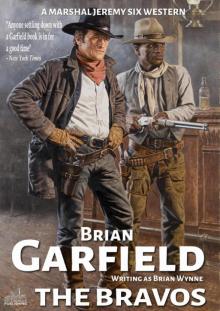 Marshal Jeremy Six #3
Marshal Jeremy Six #3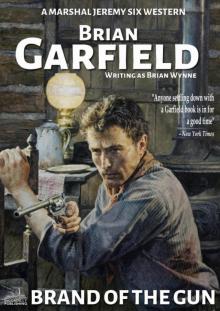 Marshal Jeremy Six #6
Marshal Jeremy Six #6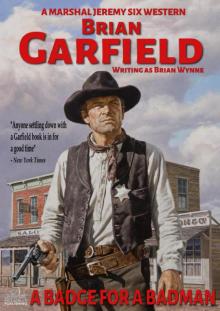 Marshal Jeremy Six #5
Marshal Jeremy Six #5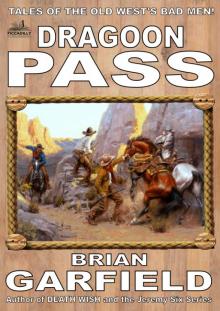 The Outlaws 2
The Outlaws 2 Marshal Jeremy Six #7
Marshal Jeremy Six #7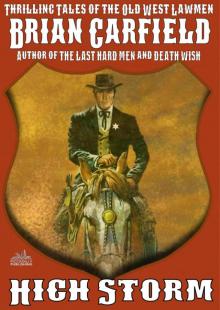 The Lawbringers 4
The Lawbringers 4 Marshal Jeremy Six #4 the Proud Riders
Marshal Jeremy Six #4 the Proud Riders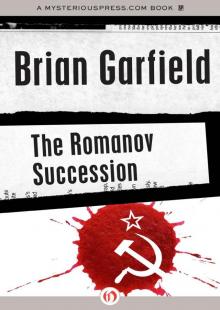 The Romanov succession
The Romanov succession Marshal Jeremy Six #8
Marshal Jeremy Six #8 Sliphammer
Sliphammer Line of Succession
Line of Succession Deep Cover
Deep Cover Kolchak's Gold
Kolchak's Gold Death Wish
Death Wish Suspended Sentences
Suspended Sentences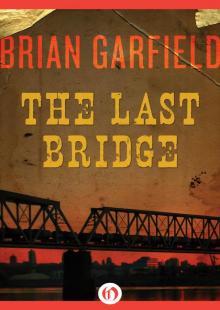 The Last Bridge
The Last Bridge Relentless
Relentless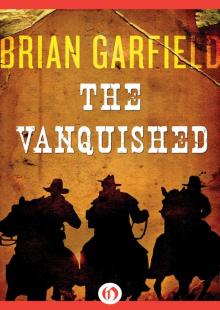 The Vanquished
The Vanquished The Last Hard Men
The Last Hard Men Hit and The Marksman
Hit and The Marksman Villiers Touch
Villiers Touch Target Manhattan
Target Manhattan Marchand Woman
Marchand Woman What of Terry Conniston?
What of Terry Conniston? Threepersons Hunt
Threepersons Hunt Checkpoint Charlie
Checkpoint Charlie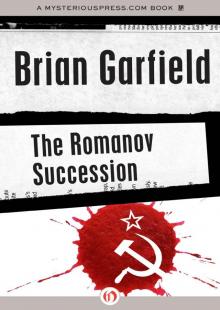 Romanov Succession
Romanov Succession Necessity
Necessity Death Sentence
Death Sentence Fear in a Handful of Dust
Fear in a Handful of Dust Hopscotch
Hopscotch